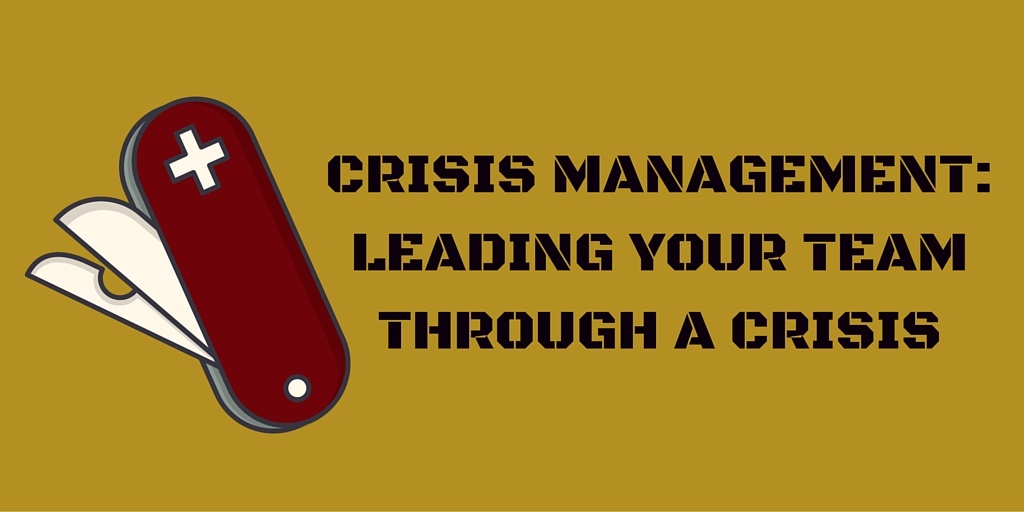
Every organization is due to face a crisis. Whether it is a flooded warehouse, building fire, employee theft, losing a big client, the security of your network being compromised, or the loss of a major player in your organization. How do businesses survive?
There's nothing like a crisis to see how flexible and understanding people can be. Employees may volunteer extra hours into restructuring your operations, new talent may be introduced via referrals or temporary workers, and that big client may return months or years down the line.
On the other hand, disasters cause about half of businesses to close their doors within a year of the disaster. There's the downtime which reduces revenue, cost of repairs, being unable to offer the same product due to materials being unavailable, the possibility of lawsuits, and potential injury to your business's reputation.
So what about now? How can a business prepare for the curve balls? How can there be a plan for every possibility? The truth is you can't foresee every type of crisis, but there are some common areas in any disaster or crisis plan.
Communication
How does your organization communicate with each other versus how would they communicate during a crisis? Be sure to plan for at least three different methods for communicating with workers, partners, and customers in case one or two channels are not available. Keeping ahead of speculation may save your business's reputation.
Who can act as a spokesperson for your business?
Decide who will be the person to speak during the crisis so everyone knows to divert questions and avoid gossip and speculation that can hurt your business's relationship with your clients, employees, and vendors. This person should be higher up in the organization and have access to the various channels through which the facts may be released.
What should we say?
Be transparent, but optimistic You want to have the first word. This is because the worst can always be assumed. And unfortunately once information gets out, whether true or false, it has legs. Fortunately, it is possible to have a series of prepared statements that can be deployed quickly for when a crisis hits.
Focus emergency communications on relevant information.
You may not have realized every aspect of this particular emergency, but it is still important to get in touch with what information you do have. There is always the opportunity to provide an update. Having a website or a page on your company's website dedicated to emergency notifications can be easily updated without having to send all updates via your chosen communication channels.
READ MORE: How To Reconnect After A Disaster
Be flexible and agile
Your basic plan template and documentation should be sufficient for managing most emergency situations. A basic statement about an office being closed can be quickly sent, but the next steps including how employees can work, where they can work, and who is essential to your business continuation may flex one way or another depending on the crisis. It helps to pinpoint now what those essential functions are and to create the contingency plan for the where and how so you can minimize downtime.
Cross-train employees or outsource
Plan that certain job functions may be more in demand during a crisis. It is important to have people available to fill those functions. Training people within your organization to be able to step into a different role on a temporary basis may be a good option. However, some functions may require specialized training that your business does not want to invest in. In that case, reaching out to staffing agencies now may be a good way to find where you can find the talent that you need during a crisis.
During the crisis, take time to focus on the details
You have employees that want your business to succeed and survive a crisis. Be sure to note who these people are in your organization. Was there someone who was willing to pull an all-nighter to communicate with your vendors to reroute shipments? Did one of your sales people take on the task of sorting through the files of a former staff member? Did staff volunteer their time to help move to a temporary workspace? Also keep track of how long certain procedures took to get back in place.
After the crisis, get back on track
It is possible to acquire metrics of success. Surveys can help confirm with your employees and clients dedication to their needs and the commitment to minimize inconvenience. This can help strengthen the relationship with the people who keep your business alive. Encourage your employees with the plan for the future. Look at your pipeline, schedule appointments with prospective clients, make those phone calls, and negotiate with suppliers for mutually favorable terms while your business recovers.
Put in the face time
Remember those employees who went above and beyond? Be sure to thank them in person or improve morale by thanking your team in a public way. Be sure to also apply this to those clients that were patient during any delays while you were rebuilding. Depending on your type of business, there are a variety of ways to show appreciation toward your customers. A phone call, a card, or even launching a specific promotion can help cement that your business is here to stay and is dedicated to their customers.
Once your plan is organized, be sure to review and test the plan regularly. Update statements and methods for contact as new technology and people join your organization. Whether your business is preparing for a crisis, in the midst of a crisis, or are currently in the recovery stage, you can still turn the situation into an opportunity to prove your commitment to your customers and employees.
Other Resources:
Article: How to Become A Master of Crisis
CDC: Emergency Response Resources for Businesses
